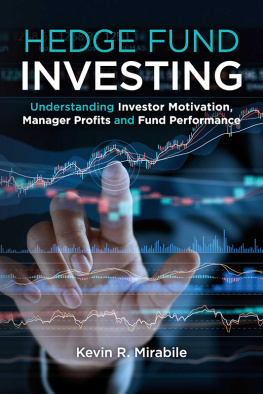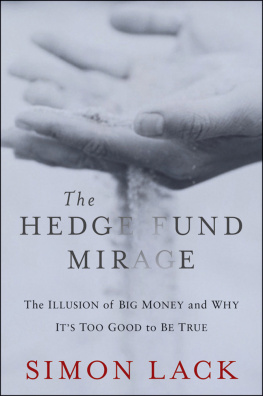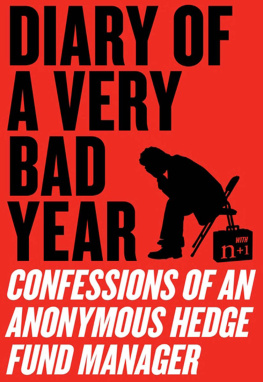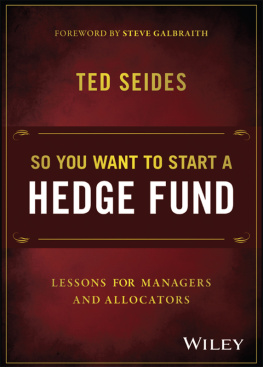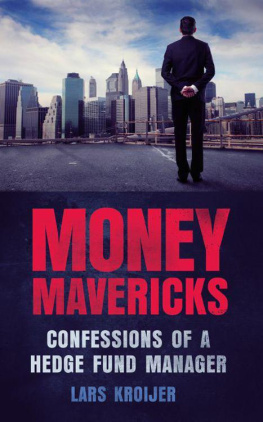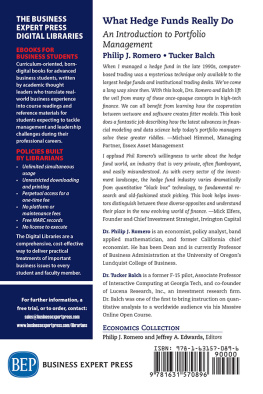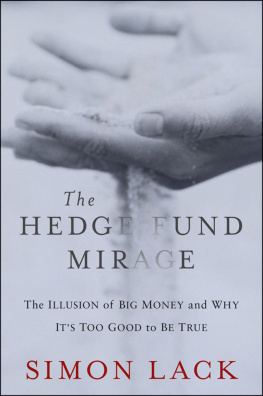THE FRONT OFFICE
A Guide to Hedge Funds for
Retail, Day Traders, and Aspiring Quants
Tom Costello
Introduction
I n 2019, a year of more or less average performance for the financial markets, the hedge fund industry collectively extracted 224 Billion dollars in profit and kept 37.4 Billon of it for themselves. Theyve done a similar thing every year, for well over 20 years. To put a sense of scale to that, right now Wikipedia lists the Annual GDP of Greece and New Zealand at 209 Billion, and 206 Billion, respectively. Slightly less than hedge fund industry returns.
The average annualized performance of a hedge fund in 2019 was about 11%. But whats often missed in the press when they talk about averages, is that there is a huge and persistent gap between the best performing hedge funds and the worst performing, which makes the average performance a meaningless statistic. More helpful is the knowledge that the return profile of the hedge fund industry is a Pareto distribution, and something close to 80% of that 224 Billion in yearly profits came from the largest 20% of hedge funds, who seem to have a distinct advantage over everyone else.
The worst hedge fund performers, who are also almost always the smallest, lost money overall. They do so every year. But believing that their poor performance is caused by their smallness gets the cause and effect wrong. Its considerably easier to manage a small amount of money than a large one. The most common reason those small hedge funds are small and stay small, is because they dont understand the markets in the same way that the larger funds all do, so they never get to the same level of profitability. If they did, the market would be only too happy to see them grow.
On almost any topic, there is a great deal of diversity of opinion in the hedge fund world. But there are some ideas that everyone in that top 20% have in common, and those ideas are almost never shared by the bottom 80%. The leaders share a perspective on how to look at the markets in order to find an opportunity. Its a view that lays out which kinds of ideas to invest time and energy in exploiting, and which kinds of ideas to reject or ignore.
Those of us who got our experience at the top tier were all taught it, but we almost never talk about it. Ive never seen it successfully explained anywhere in print, and with 30 years in the business talking almost exclusively to money managers and those who aspire to the role, Ive never met anyone who taught it to themselves. But its often whether someone can both understand this perspective and convey an understanding of it to others, thats the determining factor in whether theyre viewed as a hedge fund insider or an outsider.
To be a bit more precise, this view is a perspective on what markets are, how they work, and what the most reliable way to think about them is if you want to exploit them for gain. It can be described as the intellectual and philosophical underpinnings which support the thinking of the top performers of the hedge fund industry. As far as Ive been able to tell, the only way that people can acquire a working knowledge of these concepts, is by spending time in the industry itself.
Thanks in part to declining standards in education, this perspective certainly isnt immediately intuitive to you if you havent. And because it isnt, those who are self-trained in the financial markets never seem to find it on their own. Instead, they waste a spectacular amount of time chasing what to leaders in the space, look like obvious dead ends.
I dont want you to get the wrong idea. Im not talking about some closely guarded secret thats only revealed to you during some pseudo-religious rite in an investment bank basement, after you pledge your eternal soul to the gods of Davos. Its nothing like that. And it isnt technical information either. All the mathematical information on how to price an option or bootstrap a yield curve is all available on the internet for free. If you can afford to invest in a Bloomberg terminal, theyll do all the technical math for you.
What Im talking about is how all that information is all tied together and what that should mean to you if you want to turn as reliable and as large a profit as the leaders in the space. A winning hedge fund thinks about markets in ways that makes them more likely to win. And that means that at some level their thought processes are similar, regardless of the specific strategies they pursue.
For me, the difference in perspective is deeply reminiscent of the parable of the blind monks seeing an elephant for the first time. One touches its leg and declares it to be like a tree, another touches its trunk and declares it to be like a snake, a third touches its side and claims that its like a boulder. Theyre all telling people the truth, and none are completely wrong given the portion theyre exposed to. But none are seeing the whole creature. To those of us who came up on the institutional side of the markets, it looks very much like most people get their trading instruction only from blind monks.
By far the most common error of the self-taught is the belief that the smart people win and the dumb people lose. The gap between the best and the worst performers is definitely not a matter of intelligence. There are lots of brilliant people outside the institutional finance industry, and a great many people within it who are of no more than average intelligence. Smarter is not the secret. But the people in the largest institutions do have different knowledge than the self-taught. Theyre seeing connections which the blind monks offering advice to everyone else never seem to.
Some of those blind monks will tell you that the market is about understanding animal spirits. Others will tell you the benefits of sector rotation, or value investing, or the technical shape of some chart. Some will insist its all about balance sheet assessment or economic analysis. All of those things are perfectly valid parts of the market, but none of them describes the whole thing. Im going to ty to explain how, to the people who have achieved the highest levels of success in the hedge fund world, the elephant that is the market, looks exactly like an elephant.
Im firmly convinced that there is no domain in the modern world where the Dunning-Kruger effect is more common than the stock market. If youre one of those people who has come by some trading expertise, then youve probably seen it too. Even though a great many people, maybe even a majority, believe they completely understand how markets work, if they did, there would be no hedge fund industry at all, let alone one that consistently takes 224 Billion a year from other people, year, after year, after year. Im going to explain to you how they do that. Im going to share the perspective that I learned working with and for them, in the hope that you can add your best effort to the process, and maybe do as well as they do.
This is not an entry level book. Its a book for the self-taught so it contains some very basic concepts as support for more complex ideas, but if you dont already understand the basic goals of trading for a living, you might not get much out of it. Its really a book for someone who thinks, or at least hopes, they might be ready to take a shot at getting into the hedge fund world. Those are the people Ive had my direct experience with, and this book speaks to the issues that I know people in that position most often miss.
This book contains almost no math, but its not for the innumerate. I left all but the most basic math out because there are a million other places you can find that instruction for free from someone who can probably explain it better than I can. After 30 years as a quant, Im hardly innumerate either, but Im in no danger of winning a Fields Medal. The math does matter though, so hopefully youll be inspired to look into it on your own.


